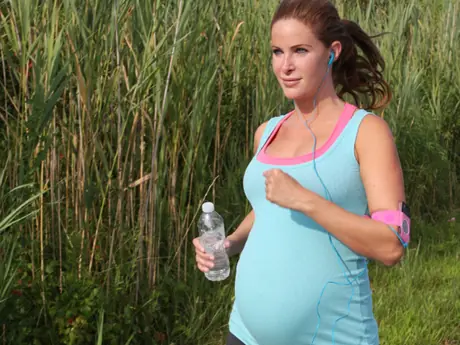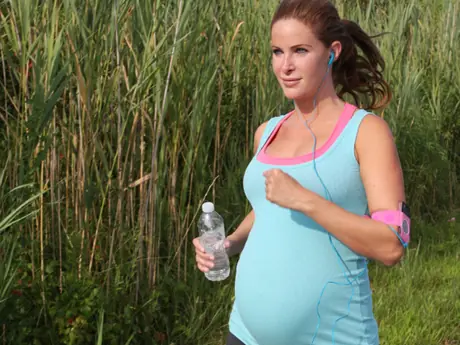Goucher also let her heart guide her decision, but it took her years to feel ready. She and husband Adam first planned to try after the 2004 Olympics, but put it off when Kara didn't make the team. They then thought, after Beijing. But when the 2008 games wrapped, Kara hadn't won any hardware, and wanted to launch a marathon career.
The pattern continued. She ran the New York City Marathon, then Boston. When Goucher had a bad day at the Berlin Marathon, her husband expected to hear "Just one more race!" yet again. Instead, the minute she crossed the finish line Goucher thought, I'm ready. "There was no more feeling of 'What if?'" she says. "But I'm glad I waited, I think I would have felt regret if I'd done it earlier."
The window between the 2008 and 2012 Olympics was a key factor for both Radcliffe and Goucher, but for Kastor, the timing was pure luck. While training last fall, Kastor suddenly felt exhausted. When she couldn't hit her time goals in workouts, a blood test revealed she was pregnant. "Both Andrew and I have always been so goal-oriented that there never seemed time for a child," she says from her home in Mammoth Lakes. "We needed the surprise. It was just what had to happen in order for us to start a family."
By Slowing Down During Pregnancy
As any woman who is been pregnant will tell you, the exhaustion that sent Kastor to the doctor's office often defines the first trimester. You don't understand the word "tired" until you've been pregnant, Radcliffe has stated. "The first few months were the most tired I've ever been in my life," says Kastor, "more than any marathon training."
Goucher was also nauseous and fatigued those first three months, but as her pregnancy progressed, her energy increased. Both Goucher and Radcliffe ran throughout their pregnancies by decreasing their mileage and lowering their intensity.
In fact, since Radcliffe and Goucher were pregnant at the same time, the two trained together for a few months while expecting. Side stitches kept Kastor from running at all during the last two trimesters, but it didn't bother her one bit. "For me, whatever was going to make my body happy and produce a healthy child was fine," she says.
By Coming Back in Their Own Way
Just as every woman's pregnancy is different, how quickly she can return to running varies. Despite the long break, Kastor predicts a fast return. "I seem to get into shape fairly quickly and with my hunger to get back, I don't anticipate it taking too long," she says. If her first run is any indication, she's right. She'd planned a very short loop around the block, but felt "like [her] body was craving to get out there again," so she went for 30 minutes.If Radcliffe's goal during her pregnancy was "to run and feel good," her return has been all about avoiding injury. Radcliffe suffered a stress fracture after her first child, so this time around she began with cross training, and then slowly transitioned to running.
Goucher jumped right in after giving birth, quickly building up to 95 miles a week. Although she found this increase in mileage exhausting, the challenge was minimal compared to the task of re-learning to push through pain. "When pregnant, you have to watch your intensity, so I'd forgotten what it's like to hurt, to ride that line and keep going," she says. But Goucher's mental grit soon returned, exhibited in a personal record of 2:24:52 at the 2011 Boston Marathon six months post-partum.
- 2
- of
- 4








Discuss This Article